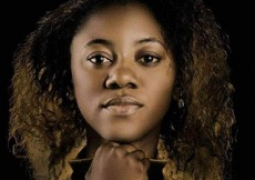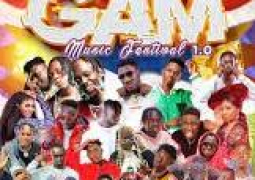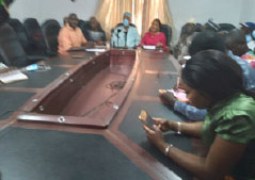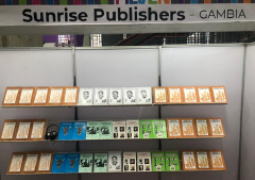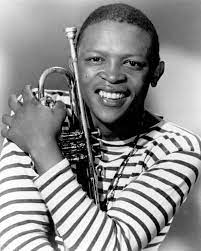
It is also important to know that Masekela together with Abdullah Ibrahim (Dollar Brand), Cyphus Semenga Mariam Makeba and Latta Mbulu are the pioneers of South African Jazz and were very instrumental in introducing African Jazz to the western world.
It was in the early seventies when I met Hugh. It all happened through Minkailu Janneh (Minks) who was a friend to Hugh. Minks, at the time was a student in Boston, Massachusetts and would later move to New York to finish his studies at Columbia University where I was also a student. Among our group were other friends like Sharif Samsu Shariff Sallah , my late brother Adi Njai, Saihou Njai (Artist) our sister Jabou Joh and Momodou Ceesay (kayorr). We all came to know Hughie as he was fondly called through his music and his activism in the anti-apartheid struggle. During this period, we visited jazz clubs in the New York and Boston area and attended anti-apartheid rallies where oftentimes Hugh will perform. We started listening to jazz more with special affinity for Masekela’s music. We were inspired by songs such as, GOLD, MACE & GRENADE, CHILD OF THE EARTH, IN THE MARKETPLACE, BAJA BULA BUNKE, STIMELA and many others. The songs GOLD and MACE & GRENADE are from his early recordings and were expressions of the hardships and struggles of the black population in South Africa during the days of apartheid.
Hugh Masekela has worked and collaborated with musicians from the entire spectrum of the music fraternity and it was this approach which led to his collaboration with Fela Kuti and through Fela, he met and worked with a group of young Ghanian musicians called HEDZOLEH SOUNDZ. His album with this band is called Introducing Hedzoleh Soundz”. This album is one of my favorite albums. At a concert in Boston introducing the band, we were thrilled by Masekela when he would at times leave the stage and come close to our table blowing his horn directly at us. This made us feel honored. At that show, was my late brother, Adi Njai, the late Sagarr (Michelle Mendy, Saihou Njie (artist) our sister Makeda Millet Camara from Panama and Minks. Hugh Masekela was like a big brother and a mentor to many of us and although we will miss him dearly, his legacy will live through eternity. Hugh also loved listening and dancing to afro Cuban music and would at times join us at a popular salsa club in Manhattan called - Corso to listen to the likes of Johnny Pacheco, Celia Cruz and Orchestra Broadway.
His birth name is Hugh Ramopolo Masekela. He was born in Kwa –Guqa Township, Witbank, South Africa on 4th April 1939. He is a musician, singer, composer and bandleader. His main instruments are the trumpet and flugelhorn, but he also plays the trombone and the cornet. He began singing and playing the piano at an early age, and when he was fourteen, he started playing the trumpet. His first trumpet was given to him by Archbishop Trevor Huddleston, the anti-apartheid chaplain at the local St. Peter’s Secondary School. At that time, there was a Municipal Brass band headed by a guy known as Uncle Sauda, and the Archbishop entrusted Masekela under Uncle Sauda’s tutelage to teach him the rudiments of trumpet playing. Hugh quickly mastered the instrument and in the process, he influenced his schoolmates which led to some of them also starting to play instruments and together, they formed the Huddleston Jazz Band, becoming South Africa’s first Youth Orchestra.
In 1956, Masekela joined Albert Herbert’s African Jazz Revue and throughout the 50’s and 60’s, he played music that closely reflected his life experience. His music protested against apartheid, slavery and the hardships being endured by his people, and in 1958, inspired by the group Manhattan Brothers, he joined the orchestra of the musical- King Kong. This was South Africa’s first successful theatrical work, touring the country for a sold-out year with Miriam Makeba and the Manhattan Brothers’ Nathan Mdledle as lead singers.
In 1959, he joined Dollar Brand (Abdullah Ibrahim), Kippie Moeketsi, Makhaya Ntshoko and Johnny Gertze to form the Jazz Epistles, the first African Jazz group to record an LP and perform to sold out audiences in Johannesburg and Cape Town from 1959 to 1960. On March 21st 1960, what became known as the Sharpeville Massacre took place in South Africa where 69 protesting Africans were shot dead by the South African Security Forces. The government then banned gatherings of ten or more people and increased the brutality of the Apartheid state. Masekela was forced to leave his country and with the help of Trevor Huddleston and other friends, he travelled to London and enrolled at the Guildhall School of Music. During this period, he visited the United States of America where he was befriended by Jamaican born musician Harry Belafonte who also assisted him to enroll at the prestigious Manhattan School of Music where he studied classical trumpet. Throughout this time he maintained close contact with Miriam Makeba, and in 1964, they got married.
While in the United States, he played primarily in jazz ensembles and made guest appearances on recordings by the Byrds in the songs, “So You Want to Be a Rock and Roll Star” and “ Lady Friend”, and with Paul Simon in the song “Further to Fly”. Hugh also made name for himself with the hit songs “Up, Up and Away” and “Grazing in the Grass” which sold four million copies. He performed at the Monterey Pop Festival in 1967 and subsequently featured in the film-Monterey Pop. In 1974, Masekela joined his friend and long time producer-Steward Levine to organize the Zaire 74 Music Festival in Kinshasa to coincide with the world famous Rumble in the Jungle boxing match between Muhammad Ali and George Foreman.
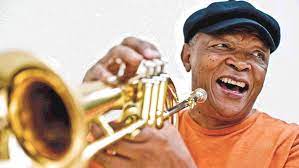
A renewed interest in his African roots led to collaborations with West and Central African musicians, but he again reconnected with South African players when in association with Jive Records, he set up a mobile recording studio in Botswana just outside the South African border and recorded a new brand of music called-Techno Bush. In 1985, Masekela founded the Botswana International School of Music which gave opportunity to musicians of all ages to play and perform together. Also in the 80’s, Hugh toured with Paul Simon in support of Simon’s album-Graceland which featured other South African artists such as Ladysmiyh Black Mambazo, Miriam Makeba and Ray Phiri. He also collaborated with the band Kalahari and worked in the musical development of the Broadway play-Sarafina.
In 2003, Masekela featured in the film-Amandla and in 2004, he released his autobiography, Still Grazing: The Musical Journey of Hugh Masekela. His song “Soweto Blues” sung by his former wife Miriam Makeba is a blues/jazz piece that mourns the carnage of the Soweto riots in 1976. In 2010, Hugh was featured with his son Selema Masekela in a series of videos on ESPN. The series called- Umlando (Through My Father’s Eyes) was aired in 10 part series during ESPN’s coverage of the FIFA World Cup in South Africa. Hugh Masekela is considered the “father of South African Jazz”, together with Miriam Makeba, they introduced modern African music to the Western world. He lived a very happy and productive life and I implore all my readers to find his music and celebrate his life by listening to his beautiful work.
Hugh Masekela died in Johannesburg on Monday 23rd January 2018 from prostate cancer at the age of 78. May his soul rest in eternal peace.


